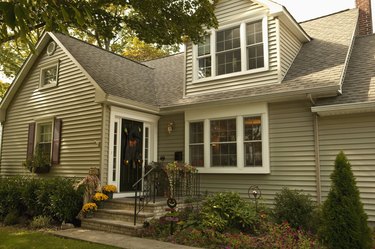
Interior additions can have an impact on the design of your home's exterior. Adding a window to a room will change the proportion of windows on your home when viewed from the outside. The proportion of windows to outside wall space will depend on your home's style and location, as well as your personal preferences. If you know the right proportion, you can determine the size of your windows to maintain that ratio.
Design Considerations
Video of the Day
The correct proportion for windows is partially based on design considerations for the house. If you want to make a large outside wall appear smaller, install a large window in it, but small windows make a wall appear larger. Be sure to adhere to any local building codes concerning minimum window sizes when choosing your windows.
Video of the Day
Energy Efficiency
Windows are considered weak spots in the wall where cold air can seep into your home. The local climate will help you to determine the correct proportion of windows to maximize your energy efficiency. Generally, the more windows you have, the more heat is lost from your home. In cold climates, the area covered by windows might be as low as 15 percent of the walls, but this can increase to 50 percent if the windows are installed on the south side of the house, which receives the most sun. Windows on the sunny side of the house passively heat your home with sunlight. As with any window construction, check the local building codes for specific proportions for your area.
Architectural Style
The style of your home plays a role in the number of windows and their proportion to the rest of the wall. For instance, sidelight windows flanking the door and overhead transom windows are generally smaller in Federal, Victorian or Tudor styles, as noted in "Glass House: The Art of Decorating with Light, Volume 10," by C. J. Petersen. To match the number and proportion of windows for your home to a particular style, look at pictures of other homes in the same style.
Existing Windows and Doors
The existing windows and doors will help you to choose the best size for new windows. Apply the height and width ratio of your existing windows to your new windows. Align the windows to create horizontal and vertical design lines, and keep the window placement symmetrical.
Visual Test
One way to see if your new windows are proportionate to the existing windows and to the house is to draw a scale model and eyeball it. People looking at your house from the street will not be measuring your windows with rulers to see it they are the right size in relation to the exterior wall. They will use their eyes, and so should you when planning the windows on paper.